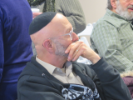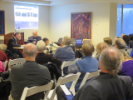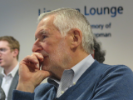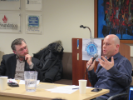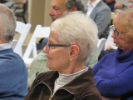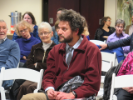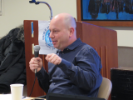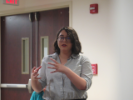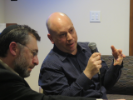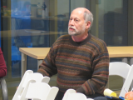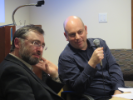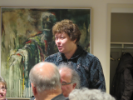Vibrant discussions following “’Jews Won’t Replace Us’: Charlottesville Protest as a Challenge to Jewish Thought”!

With a packed room of community members and UB undergraduate and graduate students, Professor Noam Pines embarked on his discussion of “’Jews Won’t Replace Us’: Charlottesville Protest as a Challenge to Jewish Thought”
Professor Noam Pines in conversation with Professor Sergey Dolgopolski
Based on his research, Professor Pines advanced a notion of unmediated violence as the key concept for a new, more refined understanding of the nature of Nazism both in its classical form in the Third Reich and in its contemporary manifestations in the United States and abroad. Professor Pines argued that unlike fascism, which presumes a figure of Fuerher (a political leader standing both within and above the law), Nazism and Neo-Nazism is rooted in using words and acts as means of a power grab — beyond and independently from their conventional meaning. The core of such power grabbing consists on one hand in objectifying people by identity labels, and the on other hand in appealing to those primordial elements of human body and psyche that escape labels and identities, Pines argued.Professor Pines drew this portrait of unmediated power grab and unmediated violence from his research in literary works of modern Jewish writers—from German Jewish poet Heinrich Heine, to Russian Jewish author Chayim Bialik, to German-Czech Jewish writer Franz Kafka and others.
The presentation of his work generated a fruitful discussion among the audience which helped expose the true complexity of the topic. The audience took an active part in the presentation by asking clarification questions which generated engaging, vivid, and deeply interesting discussions after the talk. The dialogue following Professor Pines’ talk, focused primarily on the question of how his account of Nazism as an unmediated power grab and unmediated violence compares to a view of Nazism and fascism alike as ideologies [states of “false consciousness”] depending, as they always are, on preexisting state structures. The audience left the room with an advanced understanding of both the complexity and the urgency of the issue.
